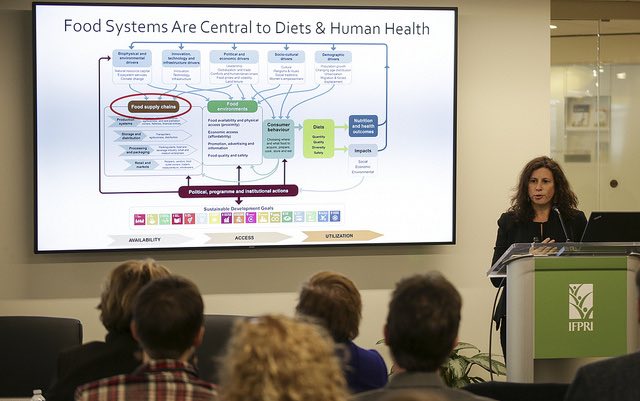A coordinated, multi-sectoral effort is essential to address chronic malnutrition and other dietary challenges plaguing the world’s food systems, according to the recent report, Nutrition and Food Systems, by the UN High Level Panel of Experts (HLPE) on Food Security and Nutrition.
At the U.S. presentation of the report Jan. 18—organized by IFPRI, HarvestPlus, and the CGIAR Research Program on Agriculture for Nutrition and Health (A4NH)—participants focused on the growing worldwide problems of overnutrition.
“As traditional food systems give way to the modern, epidemiology too is shifting from undernutrition to obesity,” said panelist Jessica Fanzo, lead author of the report and Bloomberg Distinguished associate professor of Global Food and Agricultural Policy and Ethics at Johns Hopkins University.
Nearly 2 billion people worldwide lack key micronutrients, while 2 billion adults are overweight or obese, exposing the double burden of nutrition associated with food systems. Fanzo discussed how the burden of malnutrition differs across the three food systems: Traditional, modern and mixed. Traditional food systems have the highest prevalence of stunting, wasting and mortality in children under 5 years of age and vitamin A deficiency, whereas modern food systems report highest prevalence of adult overweight and obesity. Mixed systems, meanwhile, face both problems—a significant challenge for policy makers and development organizations.
These multipronged issues can be addressed by integrating nutrition within national policies, programs and budgets; enhancing global cooperation to end hunger and malnutrition; and recognizing conflicts of interest, she said. “We have 12 years left of Sustainable Development Goals. Let’s make this the only decade of action on nutrition that we need,” Fanzo added.
Bringing in the donor perspective, Barbara Hughes, director of the Office of Maternal and Child Health and Nutrition, Bureau of Global Health, USAID, said the development community should be bold, creative, and imaginative in forming partnerships. Many of the recommendations contained in the report align with the agency’s work on the first 1000 days as the critical period for infants to grow into strong productive individuals. Hughes emphasized that better governance and accountability can help achieve priorities that transcend individual sectors.
Unpacking the complex relationship between economic development and changes in dietary patterns, Derek Headey, senior research fellow, IFPRI, pointed out a perverse dynamic: Unhealthy, processed foods are getting cheaper and healthy foods, such as fruits and vegetables, are becoming more expensive in many poor countries. Headey also noted that as more women, traditionally seen as food preparers, enter the workforce, the convenience of processed foods grows more attractive—also impacting nutrition.
Tufts University Professor Eileen Kennedy, a member of the HLPE steering committee, provided background to the report, commissioned by the UN Committee on Food Security. The report grew out of one of the initial concept notes, and emerged after extensive debate and discussion among members.
Food companies play an enormous role in emerging food systems and wield disproportionate power, often aggravating problems of overnutrition, panelists noted. But they agreed that the private sector should not be demonized and it is important to work together. “We don’t want a war with the food companies. We need diplomacy and external pressures to make them provide healthy food,” Headey said.
Lynnette Neufeld, director of Knowledge Leadership at the Global Alliance for Improved Nutrition (GAIN), agreed. “At GAIN, we are not pro-business, but pro-working with business,” Neufeld said. Citing the example of gluten-free products flooding supermarkets in the United States, and food industry scrambling to meet the demand, Fanzo said that demand can shape supply too: “We need to shift both sides—not only governments, but also consumers.”
Ultimately, Neufeld said, action alone will not determine results during this decade of action on nutrition. We need better tools to gauge the impacts of action—a framework for nutrition measurement and indicators.
Smita Aggarwal is an IFPRI Communications Specialist.







